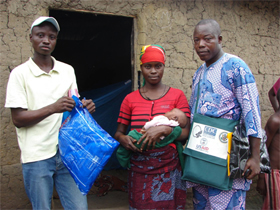
In Benin, Catherine Degboesse and her newborn baby receive a free insecticide-treated mosquito net from Simon Kpossa (left), a member of the Ministry of Health's net distribution team. Source: André Roussel, USAID/Benin
The President’s Malaria Initiative (PMI)
Benin is one of the 15 original countries benefiting from PMI, which was launched in 2005 and is led by the U.S. Agency for International Development and implemented together with the Centers for Disease Control and Prevention.
As a key component of President Obama’s Global Health Initiative and with the Lantos-Hyde Act of 2008, PMI’s funding has been extended through fiscal year (FY) 2014, and a new six-year malaria strategy has been developed. Under the new strategy, the goal of PMI is to work with partners to halve the burden of malaria in 70 percent of the at-risk populations in sub-Saharan Africa (approximately 450 million residents), thereby removing malaria as a major public health problem and promoting development throughout the African region.
PMI works with national malaria control programs and coordinates its activities with national and international partners, including the Roll Back Malaria Partnership; The Global Fund to Fight AIDS, Tuberculosis and Malaria; the World Health Organization; the World Bank; Malaria No More; the Bill and Melinda Gates Foundation; nongovernmental organizations, including faith-based and community groups; and the private sector.
Key Interventions
- In line with Benin’s national malaria control strategy, PMI supports four key interventions to prevent and treat malaria:
- Insecticide-treated mosquito nets (ITNs): Sleeping under a long-lasting ITN provides protection from malaria-carrying mosquitoes. The nets are nontoxic to humans, but can repel and kill mosquitoes for up to three years.
- Indoor residual spraying (IRS): IRS involves the coordinated, timely spraying of the inside walls of houses with insecticides. Mosquitoes are killed when they land on these sprayed walls, reducing malaria transmission.
- Intermittent preventive treatment for pregnant women (IPTp): IPTp is a highly effective means of reducing the serious consequences of malaria in both the pregnant woman and her unborn child, which include maternal anemia and low birthweight babies. IPTp consists of the administration of at least two doses of the antimalarial drug sulfadoxine-pyrimethamine (SP) given not less than one month apart during the second and third trimesters of pregnancy. In most countries, SP needs for IPTp are being met by national governments and other donors.
- Diagnosis and treatment: Effective case management of malaria depends on early, accurate diagnosis with microscopy or rapid diagnostic tests (RDTs) and prompt treatment with an effective drug. Artemisinin-based combination therapies (ACTs) are the recommended first-line treatment for uncomplicated Plasmodium falciparum malaria in most malaria-affected regions of Africa, and are extremely effective against malaria parasites; they have few or no side effects.
Leave a Reply
You must be logged in to post a comment.